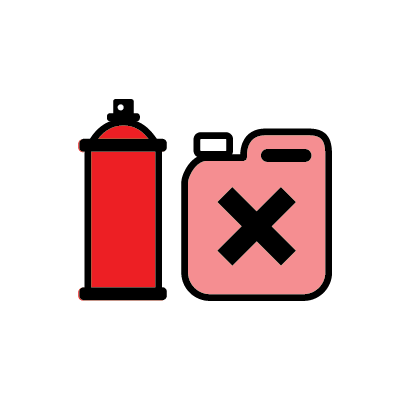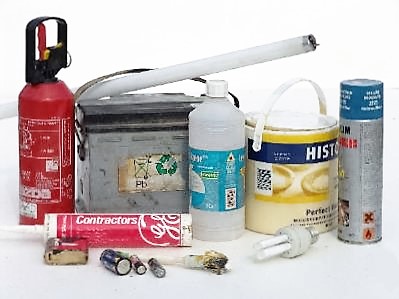
Small Chemical Waste (KCA in Dutch) is household waste containing chemicals that can be harmful to health and the environment, like lead, mercury or organic solvents. Batteries, aerosols, gasoline and turpentine are examples of small chemical waste.
The waste recycling point only accepts small chemical waste in household packaging!
Maximum contents per kind, per visit are as follows:
- Wall paint: 12,5 liter
- Turpentine, thinner, benzene etc.: 5 liter
- Polish, stain, primer: 2,5 liter
- Motor oil, antifrost, coolant: 5 liter
- Herbicide: 5 liter
- Fuels: 5 liter
- Cleaning supplies: 5 liter
- Glue: 10 liter

How is the waste collected?
You can dispose of small chemical waste in its original packaging (or with a label) at a waste recycling point or a store with special boxes for chemical waste. Injection needles can be disposed at a pharmacy, or in special packaging at the waste recycling point. If you would like to arrange for your chemical waste to be collected, please contact our customer service.
Small Chemical Waste:
- Turn in your small chemical waste in their original packaging
- Only household packaging is allowed
- Shops often have special boxes for small chemical waste
- Small chemical waste can be dangerous, so don't place it on the street
- Fluorescent tubes, nail polish and medicines also belong with small chemical waste
- Same goes for pressure holders like helium tanks, gas cylinders and nitrous oxide containers
What happens to the waste?
A lot of material can be reused, like the metal from batteries. Zinc, for example, is turned into gutters and steel can be turned into nails or steel wiring. The glass from tl lights and lamps is also reused, for new lamps for example. Leftover oil can be used as fuel.

What qualifies as small chemical waste?
Yes
- Households: batteries, low-energy light bulbs, strip lights (and sun bed lamps), liquid drain cleaner, lamp oil, kerosene, frying fat, pesticides/ herbicides/insecticides
- Medicine cabinet: medicines, mercury thermometers, injection needles
- DIY: paint, varnish, stain and wood preservation agents, products used when painting such as turpentine, thinner, paint stripper, paintbrush cleaner, paintbrush softener and benzene, mercury switches (e.g. non-digital thermostat controls)
- Hobby: photo fixer, photo developing agents, etching fluids (e.g. nitric acid or sulfuric acid), hydrochloric acid
- Transport: car batteries, gasoline, motor oil, used oil, brake fluid, oil filters
- Pressure holders: helium tanks, fire extinguishers and gas cylinders (nitrous oxide too). NB: Only household packaging! Empty pressure holders also belong with chemical waste - not metal.
Tip!
"Store your small chemical waste in a special box and turn it in at the waste recycling point in your city. The special box is available from our Customer Service."





